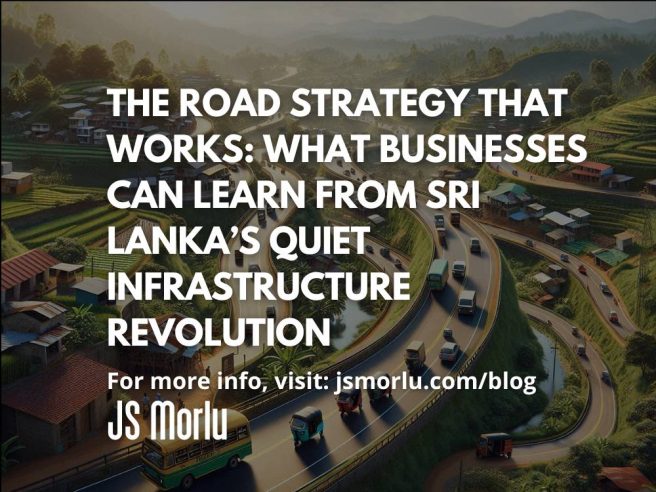By: John S. Morlu II, CPA
If you think infrastructure success only comes from multi-billion-dollar megaprojects, think again.
I spent four days traveling across the countryside of Sri Lanka — from the coasts to the hills, the towns to the villages — and while the natural beauty of this country is undeniable, what caught my attention most wasn’t the landscapes.
It was the roads.
Sri Lanka is known as the Pearl of the Indian Ocean, and rightly so. But beneath that poetic title lies something more practical, more powerful: a quietly impressive national road network that spans the country like a web — connecting people, industries, services, and possibilities.
What stood out wasn’t the number of highways, or the size of the roads, or the volume of traffic. In fact, most of the roads I traveled were modest — some just a single lane in each direction, others even narrower, especially in the villages and mountainous areas. In a few places, two lanes exist in each direction to ease flow. But the unifying feature across regions was this: they were paved, consistent, and actively used.
And from a business and logistics perspective, that matters more than you might think.
The Power of a Consistent, Connected Road Network
Sri Lanka hasn’t relied on large-scale expressways to unlock access across its territory. Instead, the country has quietly executed a different kind of infrastructure strategy — one that’s lean, scalable, and replicable.
- Single-lane paved roads, in many areas, carry buses, tuk-tuks, and delivery trucks with surprising efficiency.
- Two-lane corridors, when needed, support regional movement without requiring massive land acquisitions or budget overruns.
- Most importantly, these roads connect all parts of the country — even the most rural ones — to the rest of the economy.
From a business standpoint, that’s gold.
It means:
- Supply chains can function across regions.
- Tourism, agriculture, and manufacturing aren’t confined to urban zones.
- Employees and services can move with reliability and relative ease.
- Costs of delay, transport damage, and route detours are significantly reduced.
In essence, Sri Lanka has developed a “last-mile-first” mindset, ensuring that infrastructure doesn’t just serve the cities but reaches the people, products, and possibilities everywhere.
Less Concrete, More Coverage
What’s even more interesting is the discipline of this approach. There’s no overbuilding here. You don’t see six-lane highways cutting through farmland just to check a box.
You see roads designed to fit the terrain, the demand, and the long-term usage — and then duplicated consistently across provinces. That kind of design restraint takes serious planning.
Instead of pouring billions into mega highways that bypass people, Sri Lanka seems to have taken a smarter, layered approach:
- Build what’s needed
- Build it well
- Maintain it properly
- Do it everywhere
That’s not flashy. But it’s effective. It’s sustainable. And frankly, it’s a strategy that would work in many other regions.
Business Lessons from the Road
As a business traveler, I didn’t need a luxury expressway to be impressed. I needed to move from point A to B with speed, safety, and predictability — and that’s exactly what Sri Lanka’s network delivered.
Here are a few takeaways for business and infrastructure planners:
1. Roads don’t have to be massive to be meaningful. A narrow, paved road that reaches a farmer, a factory, or a startup founder is worth more than a showpiece expressway that reaches no one.
2. Design for use, not for headlines. Every Sri Lankan road I traveled served a real purpose — transporting goods, kids, tourists, and workers — with minimal disruption.
3. Connectivity matters more than complexity. It’s better to have 10,000 km of good, small roads than 500 km of grand roads disconnected from the real economy.
4. Consistency is infrastructure’s best-kept secret. A road system is only as strong as its weakest path. Sri Lanka’s strength is that even its smaller roads are reliable.
Final Thought: The Global Business Opportunity Hiding in Asphalt
Here’s what most business leaders miss: roads aren’t just transportation — they’re transaction enablers. Every smooth delivery, every rural tourist booking, every just-in-time inventory restock relies on roads that don’t crumble under pressure.
Sri Lanka isn’t trying to be loud about this — and that’s what makes it even more worth studying. It’s playing the long game. And smart businesses, investors, and regional planners would do well to take notes.
What if every developing nation focused not on flashy mega-projects, but on building and maintaining a nationwide grid of simple, paved, one- or two-lane roads that actually connect where people live and work?
You wouldn’t just see better GDP figures.
You’d see new markets open.
You’d see young entrepreneurs reach customers.
You’d see food reach cities on time.
You’d see movement — the first sign of economic life.
Infrastructure doesn’t need to be impressive. It needs to be everywhere.
And that’s the real story Sri Lanka is quietly telling — one stretch of asphalt at a time.
Author: John S. Morlu II, CPA is the CEO and Chief Strategist of JS Morlu, leads a globally recognized public accounting and management consultancy firm. Under his visionary leadership, JS Morlu has become a pioneer in developing cutting-edge technologies across B2B, B2C, P2P, and B2G verticals. The firm’s groundbreaking innovations include AI-powered reconciliation software (ReckSoft.com) and advanced cloud accounting solutions (FinovatePro.com), setting new industry standards for efficiency, accuracy, and technological excellence.
JS Morlu LLC is a top-tier accounting firm based in Woodbridge, Virginia, with a team of highly experienced and qualified CPAs and business advisors. We are dedicated to providing comprehensive accounting, tax, and business advisory services to clients throughout the Washington, D.C. Metro Area and the surrounding regions. With over a decade of experience, we have cultivated a deep understanding of our clients’ needs and aspirations. We recognize that our clients seek more than just value-added accounting services; they seek a trusted partner who can guide them towards achieving their business goals and personal financial well-being.
Talk to us || What our clients says about us






